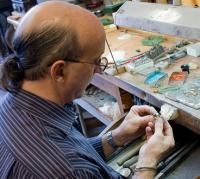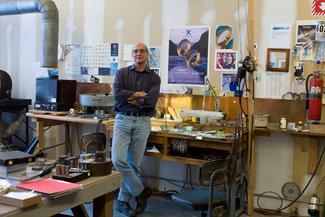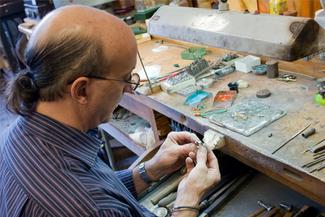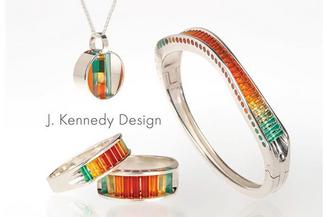Studio Tips and Tricks for Jewelers
Do you find yourself struggling with questions about studio equipment including proper care and maintenance for your tools? Have you ever wondered what the best flex shaft attachment may be for a particular task or how to achieve a perfect polish? These are just a few of the questions that will be addressed in this seminar with professional jeweler, John Kennedy.
Over the course of one day, students can expect to discover numerous tips and techniques John has perfected in his 50 years as a jeweler. His in-depth knowledge of the industry started when he was very young at the bench as an apprentice; and his studio business has taken him around the world for sourcing material and selling his work.
The day will be a mix of discussion and demonstrations as appropriate. Topics on the agenda include hand tools and proper use, shop equipment and supplies, metal preparation and finishing, polishing and cleaning, general jewelry repair / ring sizing, casting overview, bench tips, and of course, safety.
Come prepared to take notes and ask lots of questions. Students are also encouraged to submit questions prior to class so that John is able to be as prepared as possible to answer as many questions as we can in the time we have! Attendees are also invited to bring along projects they're having difficulty with, as John is a seasoned problem-solver. Although this workshop isn't designed to be hands on, students are welcome to bring some of their favorite hand tools along to the class (or tools they have questions about!) in case there is a task that comes up that may be beneficial to practice on site.
To see more of John Kennedy Design, please visit the website: jkennedydesign.com
Meet the instructor

John Kennedy is a jewelry designer who has always challenged the status quo. Since starting in the trade in the 1960's, John's work has been shaped by his quest to redefine the approach to modern jewelry design. His ability to create simple yet sophisticated pieces that capture the essence of his passion has earned him a reputation as one of the most influential jewelry designers.
John's emergence on the global jewelry design stage began in 1987 with the Intergold Competition. It was there where his talent for jewelry design was first recognized, earning him a place on Intergold's prestigious world tour. His participation on the tour introduced John’s talents and innovative designs to collectors, critics, and enthusiasts who continue to celebrate his approach to modern jewelry.
In 1993 John was awarded two US Patents for the innovative concepts he developed for Cylettes®. They represent two of the only five jewelry patents in application issued during the entire 20th century. The patents are the foundation and core of Cylettes®, a breakthrough innovation into the use of light through cylindrical gemstones. John discovered that the cylindrical cut allowed for the transmission of natural light unlike faceted stone cuts which only allow for reflection. With the groundbreaking design of Cylettes®, the interplay between light and stone no longer had to be purely reflective; it could be transformative.
By 1996, Cylettes® had become recognized by the industry as the only unique and innovative new offering in decades. John's subsequent acceptance into the JCK and the Tucson Design Centers as well as the MJSA pavilion for American designers in Basil, Switzerland cemented his status as one of the foremost jewelry designers in the world.
Today, John continues to push the boundaries of modern jewelry design. He is highly sought after by collectors and individuals who want custom designed jewelry that is elegant and refined, yet distinct from what can be found elsewhere. Recognizing that the desire for unique jewelry creations doesn't reside just with the collectors and galleries he has designed for, John has launched J. Kennedy Design to make his work more accessible to those who appreciate art jewelry.
Materials & Tools
Come prepared to take notes and ask lots of questions. Students are also encouraged to submit questions prior to class so that John is able to be as prepared as possible to answer as many questions as we can in the time we have!
Attendees are also invited to bring along projects they're having difficulty with, as John is a seasoned problem-solver.
Although this workshop isn't designed to be hands on, students are welcome to bring some of their favorite hand tools along to the class (or tools they have questions about!) in case there is a task that comes up that may be beneficial to practice on site.



